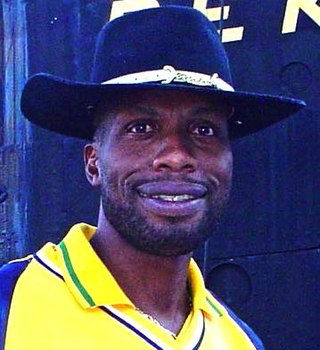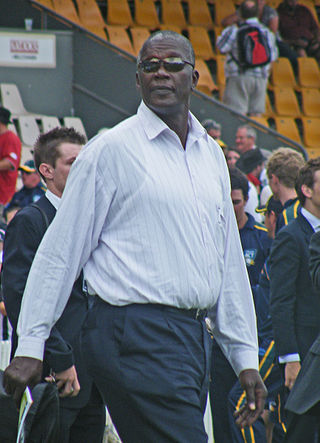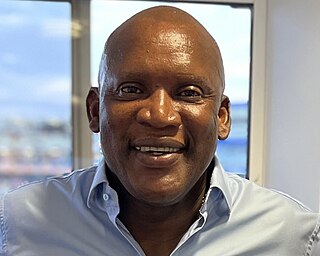
Sir Curtly Elconn Lynwall Ambrose KCN is an Antiguan former cricketer who played 98 Test matches for the West Indies. Widely acknowledged as one of the greatest fast bowlers of all time, he took 405 Test wickets at an average of 20.99 and topped the ICC Player Rankings for much of his career to be rated the best bowler in the world. His great height—he is 6 feet 7 inches (2.01 m) tall—allowed him to make the ball bounce unusually high after he delivered it; allied to his pace and accuracy, it made him a very difficult bowler for batsmen to face. A man of few words during his career, he was notoriously reluctant to speak to journalists. He was chosen as one of the Wisden Cricketers of the Year in 1992; after he retired he was entered into the International Cricket Council Hall of Fame and selected as one of West Indies all-time XI by a panel of experts.

Joel Garner is a former West Indian cricketer, and a member of the highly regarded late 1970s and early 1980s West Indies cricket teams. Garner is the highest ranked One Day International bowler according to the ICC best-ever bowling ratings, and is 37th in Tests. Garner was a member of the West Indies teams that won their second world title in the 1979 Cricket World Cup as well as finishing as runners-up at the 1983 Cricket World Cup.

Michael Andrew Atherton is a broadcaster, journalist and a former England international cricketer. A right-handed opening batsman for Lancashire and England, and occasional leg-break bowler, he achieved the captaincy of England at the age of 25 and led the side in a then record 54 Test matches. Known for his stubborn resistance during an era of hostile fast bowling, Atherton was described in 2001 as a determined defensive opener who made "batting look like trench warfare". He had several famed bouts with bowlers including South Africa's Allan Donald and Australia's Glenn McGrath. Atherton often played the anchor role at a time when England batting performances lacked consistency.

Graham Alan Gooch, is a former English first-class cricketer who captained Essex and England. He was one of the most successful international batsmen of his generation, and through a career spanning 1973 until 1997, he was the most prolific run scorer of all time, with 67,057 runs across first-a class and limited-overs games. His List A cricket tally of 22,211 runs is also a record. In 1992, he became the first cricketer to lose 3 finals of the Cricket World Cup and is currently the only such player. He is one of only 25 players to have scored over 100 first-class centuries. He was a part of the English squads which finished as runners-up at the 1979 Cricket World Cup, as runners-up at the 1987 Cricket World Cup and as runners-up at the 1992 Cricket World Cup.
Alan Philip Eric Knott is a former cricketer who represented England at international level in both Tests and One-Day Internationals (ODI). Knott is widely regarded as one of the most eccentric characters in cricket and as one of the greatest wicket-keepers ever to play the game. He was described by cricket journalist Simon Wilde as "a natural gloveman, beautifully economical in his movements and armed with tremendous powers of concentration".
Malcolm Denzil Marshall was a Barbadian cricketer. Primarily a fast bowler, Marshall is widely regarded as one of the greatest and one of the most accomplished fast bowlers of the modern era in Test cricket. He is often acknowledged as the greatest West Indian fast bowler of all time, and certainly one of the most complete fast bowlers the cricketing world ever saw. His Test bowling average of 20.94 is the best of anyone who has taken 200 or more wickets. He achieved his bowling success despite being, by the standards of other fast bowlers of his time, a short man – he stood at 180 cm, while most of the great quicks have been well above 183 cm and many great West Indian fast bowlers, such as Joel Garner, Curtly Ambrose, and Courtney Walsh, were 197 cm or above. He generated fearsome pace from his bowling action, with a dangerous bouncer. He also statistically went on to become the most successful Test match bowler of the 1980s with 235 wickets with an average of 18.47 within a time period of just five years. Marshall was a part of the West Indies team that won the 1979 Cricket World Cup as well as the team which reached the 1983 Cricket World Cup Final, but lost to India by 43 runs.

Devon Eugene Malcolm is a Jamaican-born English former cricketer. Born in Kingston, Jamaica, Malcolm played in 40 Test matches and 10 One Day Internationals for the England cricket team.
Christopher Lyall Smith is a former cricketer for Hampshire and England. He also played one match for Glamorgan in 1979, while playing in the South Wales League, and in South Africa he played for Natal B.
Allan Joseph Lamb is a South African-born former English cricketer, who played for the first-class teams of Western Province and Northamptonshire. Making his Test debut in 1982, he was a fixture in the Test and One-Day International team for the next decade. He represented England at three World Cups. He served as captain of Northamptonshire, and also captained England in three Test matches. He was a part of the English squads which finished as runners-up at the 1987 Cricket World Cup and as runners-up at the 1992 Cricket World Cup.
John Ernest Emburey is a former English first-class cricketer who played for Middlesex, Northamptonshire, Western Province, Berkshire and England. He was a part of the English squad which finished as runners-up at the 1987 Cricket World Cup.

Derek Raymond Pringle is a Kenyan-born English former Test and One Day International cricketer for England, and is now a cricket journalist. He was a part of the English squads which finished as runners-up at the 1987 Cricket World Cup and as runners-up at the 1992 Cricket World Cup.
Graham Roy Dilley was an English international cricketer, whose main role was as a fast bowler. He played first-class cricket for Kent County Cricket Club and Worcestershire County Cricket Clubs, and appeared in 41 Test matches and 36 One Day International (ODIs) for the England cricket team.
Phillip Anthony Jason "Daffy" DeFreitas is an English former cricketer. He played county cricket for Leicestershire, Lancashire and Derbyshire, as well as appearing in 44 Test matches and 103 ODIs. Cricket writer Colin Bateman noted that "DeFreitas was an explosive hitter when the mood took him, an aggressive pace bowler, inclined to pitch everything short and a spectacular fielder". He was a part of the English squad which finished as runners-up at the 1987 Cricket World Cup and as runners-up at the 1992 Cricket World Cup.
Peter Willey is a former English cricketer, who played as a right-handed batsman and right-arm offbreak bowler. In and out of the England team, he interrupted his international career for three years by taking part in the first of the England players' South African rebel tours in 1982. After his playing career ended, he became a Test umpire.
The South African rebel tours were a series of seven cricket tours staged between 1982 and 1990. They were known as the rebel tours because the international cricketing bodies banned South Africa from competitive international cricket throughout this period because of apartheid. As such the tours were organised and conducted in spite of the express disapproval of national cricket boards and governments, the International Cricket Conference and international organisations such as the United Nations. The tours were the subject of enormous contemporaneous controversy and remain a sensitive topic throughout the cricket-playing world.
Christopher James Tavaré is a retired English international cricketer who played in 31 Test matches and 29 One Day Internationals between 1980 and 1989. His style of play was characterised by long periods at the crease and a relatively slow rate of run-scoring.
Edward Ernest Hemmings is a former English cricketer, who played in 16 Test matches and 33 One Day Internationals for the England cricket team between 1982 and 1991. He made his England debut relatively late in his career, at the age of 33, having predominantly represented Nottinghamshire in the County Championship. His chance came when several England players announced their intention to go on a rebel cricket tour to South Africa. He was a part of the English squad which finished as runners-up at the 1987 Cricket World Cup.
Neil Alan Foster is an English former professional cricketer, who played 29 Test matches and 48 One Day Internationals for England from 1983 to 1993. Domestically Foster played for Essex County Cricket Club from 1980 to 1993, earning his county cap in 1983. He was a fast bowler. He was a part of the English squad which finished as runners-up at the 1987 Cricket World Cup.
Vivian Paul Terry is an English former cricketer, who played in two Tests for England in 1984.
The West Indian cricket team played 16 first-class cricket matches in England in 1988, under the captaincy of Viv Richards. They enjoyed considerable success during the tour, while England endured a "disastrous summer" of continuous change.





